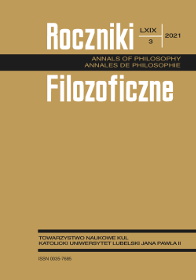Divine Openness for Physical Relationship
Abstract
The success of the atheistic hiddenness argument depends on the “consciousness constraint” it imposes on the divine-human loving relationship: namely, that this relationship requires human conscious awareness of being in the relationship with God. I challenge the truth of this proposition by introducing the concept of a physical relationship with God that is not subject to this constraint. I argue, first, that a physical relationship with God is metaphysically possible; second, that its plausibility is supported by natural theology; and third, that a perfectly loving God would prefer physical relationships with human beings over consciousness-constrained relationships, because a perfectly loving God would prefer to preserve the integrity of human freedom of participation and allow inclusion of all people regardless of their natural cognitive capabilities. I also offer an interpretation of apparent divine hiddenness in the light of the idea of God’s openness for physical relationships.
References
Cuneo, Terence. “Another Look at Divine Hiddenness.” Religious Studies 49, no. 2 (2013): 151–64. https://doi.org/10.1017/S0034412513000048.
Engster, Daniel. The Heart of Justice: Care Ethics and Political Theory. Oxford: Oxford University Press, 2007. https://doi.org/10.1093/acprof:oso/9780199214358.001.0001.
Evans, C. Stephen. “Can God be Hidden and Evident at the Same Time? Some Kierkegaardian Reflections.” Faith and Philosophy 23, no. 3 (2006): 241–53. https://doi.org/10.5840/faithphil200623329.
Ferreira, M. Jamie. “A Kierkegaardian View of Divine Hiddenness.” In Howard-Snyder and Moser, Divine Hiddenness: New Essays, 164–80.
Green, Adam, and Eleonore Stump, eds. Hidden Divinity and Religious Belief: New Perspectives. Cambridge: Cambridge University Press, 2015.
Howard-Snyder, Daniel, and Paul K. Moser, eds. Divine Hiddenness: New Essays. New York: Cambridge University Press, 2002.
Leidenhag, Joanna. “The Challenge of Autism for Relational Approaches to Theological Anthropology.” International Journal of Systematic Theology 23, no. 1 (2021): 109–34. https://doi.org/10.1111/ijst.12453.
Moser, Paul K. “Divine Hiddenness and Self-Sacrifice.” In Green and Stump, Hidden Divinity and Religious Belief, 71–88.
Rahner, Karl. “Anonymous Christians.” In Theological Investigations, vol. 6, Concerning Vatican Council II, translated by Karl-H. Kruger and Boniface Kruger, 390–98. Baltimore: Helicon Press, 1969.
Rea, Michael C. “Narrative, Liturgy, and the Hiddenness of God.” In Metaphysics and God: Essays in Honor of Eleonore Stump, edited by Kevin Timpe, 76–96. New York: Routledge, 2009.
Rea, Michael C. The Hiddenness of God. Oxford: Oxford University Press, 2018.
Schellenberg, J. L. Divine Hiddenness and Human Reason. Ithaca, NY: Cornell University Press, 1993.
Schellenberg, J. L. “What the Hiddenness of God Reveals: A Collaborative Discussion.” In Howard-Snyder and Moser, Divine Hiddenness: New Essays, 33–61.
Schellenberg, J. L. “Divine Hiddenness Justifies Atheism.” In Contemporary Debates in Philosophy of Religion, edited by Michael L. Peterson and Raymond J. VanArragon, 30–41. Malden, MA: Blackwell, 2004.
Schellenberg, J. L. “The Hiddenness Argument Revisited (I).” Religious Studies 41, no. 2 (2005): 201–15. https://doi.org/10.1017/S0034412505007614.
Schellenberg, J. L. “Reply to Aijaz and Weidler on Hiddenness.” International Journal for Philosophy of Religion 64 (2008): 135–40. https://doi.org/10.1007/s11153-008-9170-0.
Schellenberg, J. L. “Replies to my colleagues.” Religious Studies 49, no. 2 (2013): 257–85. https://doi.org/10.1017/S0034412513000127.
Schellenberg, J. L. “Divine Hiddenness and Human Philosophy.” In Green and Stump, Hidden Divinity and Religious Belief, 13–32.
Schellenberg, J. L. The Hiddenness Argument: Philosophy’s New Challenge to Belief in God. New York: Oxford University Press, 2015.
Wainwright, William J. “Jonathan Edwards and the Hiddenness of God.” In Howard-Snyder and Moser, Divine Hiddenness: New Essays, 98–119.
Weidner, Veronika. Examining Schellenberg’s Hiddenness Argument. Cham: Palgrave Macmillan, 2018. https://doi.org/10.1007/978-3-319-97517-7.
Copyright (c) 2021 Roczniki Filozoficzne

This work is licensed under a Creative Commons Attribution-NonCommercial-NoDerivatives 4.0 International License.





